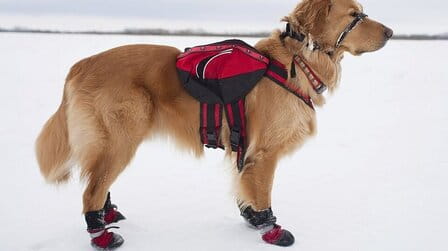One of the most crucial things you can do for your dog's health is to provide them a healthy and balanced diet. What do you need to know, therefore, in order to choose dog food wisely? The fact is that each dog has a unique set of nutritional requirements, thus there is no "ideal dog food." Instead, there are a few important aspects to think about when selecting a nutritious meal for your dog. Make sure your dog is eating complete, balanced food as an excellent place to start. And here are some steps on how to choose dog food.
How to Choose Dog Food
Ingredients
The easiest approach to ensure you are choosing the proper food for your dog is to look at the ingredients. The greatest dog foods include whole food components including grains, fresh meats, fruits, and veggies. Dogs, which do not eat meat as cats do, require a highly well-balanced diet.

Make sure there is a visible source of protein in the components. The first three components should consist of meat-based foods. Additionally, check to see if it includes omega-3-rich fats from sources like salmon, canola, and flax oil. Avoid meals that are heavy in empty fillers like wheat and soy and excessive levels of preservatives.
Weight and Activity Level
Many dog owners unintentionally feed their pets too much or too little. Knowing your dog's weight and how many calories to give it are important. You should also pay attention to how active your dog is. Dogs who are very active need a lot more calories than dogs who are more passive. You must take this action to stop both dog obesity and malnutrition.

Is Dog Food Dry Or Wet?
The amount of water in wet vs dry dog food is the main distinction. While the contents in both varieties are often the same, dry dog food is less expensive and has the advantage of not requiring refrigeration after it has been opened. Due to its low moisture content compared to wet food, which often goes bad much sooner and needs to be replenished regularly, it also has a longer shelf life. However, wet dog food often has a larger proportion of fresh ingredients and comes in a variety of tastes and textures to suit the individual needs and preferences of your dog.
It's crucial to choose a dog food that is beneficial for your pet's dental health and doesn't stick to the teeth while choosing the finest dog food. Try both options and discover which one works best for you and which one your dog might prefer.

Age And Energy Of Dog
The majority of meals are tailored to particular animal life stages (baby, adult, and senior). The nutritional balance of the food has been designed to assist your animal live the best life possible at that moment, even though the diet's contents may not vary. For instance, glucosamine is added to senior dog food to support joint health, but protein is heavily concentrated in puppy formulas to promote development.
Animals that are more active require more food. Choose a diet with a greater protein content if your dog is really active. To guarantee a seamless transition while changing your animals' diet, keep a constant check on them.
Monitor Those Treaties!
Treats are an effective teaching technique that promotes good behavior in animals. However, since we are limited to thinking about food from a human viewpoint, we occasionally fail to see the extent to which we are overfeeding our animals.
Did you know that the calorie equivalent of 112 chocolate bars for a person equals one ounce of cheese for a 20-pound dog? It is real. Treats are a fantastic tool, but they should be included carefully to a diet that is already balanced. Make sure the treats you buy for your dogs are as high-quality as the meals you provide them.
Ask Your Vet
Always consult your veterinarian before modifying your dog's food to ensure that their nutritional needs are satisfied. Your doctor is your best resource for keeping your dog happy and healthy. Additionally, finding out how much food your dog needs each day from your veterinarian is advised. Many pet owners fail to read the nutrition information on the dog food container, which causes them to overfeed or underfeed their animal.
Talk to your doctor about how you may gradually introduce your dog to their new diet to prevent pain and messes in the home. Changing your dog's food can also cause canine diarrhea and an upset stomach.
Dog's Dietary Requirements
Depending on their size, weight, age, medical history, and other factors, all dogs have varied dietary demands. For instance, pups have different nutritional needs than adult or elderly dogs. Many pups thrive on food made for all life stages or puppies. The optimal course of action for your dog will, however, depend on their size and breed. Here are some things to consider while choosing the finest dog food for your pet.
A balanced diet for dogs must include the right amounts of protein, good fats, carbs, vitamins, and minerals.

The fundamental constituent of all cells, tissues, organs, and more is protein. For the health and wellbeing of your dog, protein is crucial. Chicken, lamb, beef, turkey, fish, and eggs all include proteins.
- When compared to proteins and carbs, fats offer your pet greater energy.
- Energy-giving carbohydrates also play a crucial role in maintaining intestinal health.
- Additionally, fiber, a form of carbohydrate, is crucial for dogs' good digestion.
- Vitamins help your dog stay healthy and maintain a healthy coat and strong bones.
- Minerals: Minerals are necessary for a number of metabolic processes, including the upkeep of strong bones and teeth.
Breed, And Size Of The Dog
Your dog's size, breed, and age all affect which dog food is the healthiest for them. For example, between the ages of seven and twelve, senior dogs often start to exhibit age-related changes. Dogs in these situations go through metabolic and body composition changes that can be controlled by nutrition.
Conclusion
Because there are so many alternatives, knowing how to choose dog food for your best buddy might seem challenging. However, by understanding what constitutes high-quality dog food, you can decide which brands to choose and which to avoid. Of course, you should always discuss your dog's diet with your veterinarian to be sure they are receiving the right nutrients. Furthermore, what you feed your dog matters. For instance, overfeeding a dog can result in obesity, and feeding it too rapidly might cause hazardous stomach bloating.













